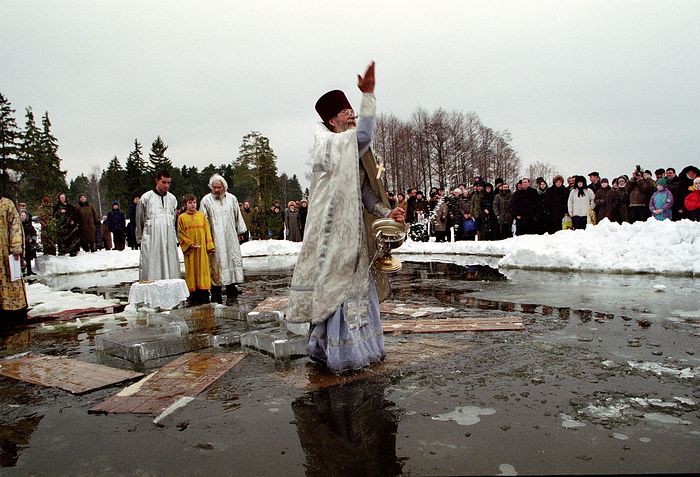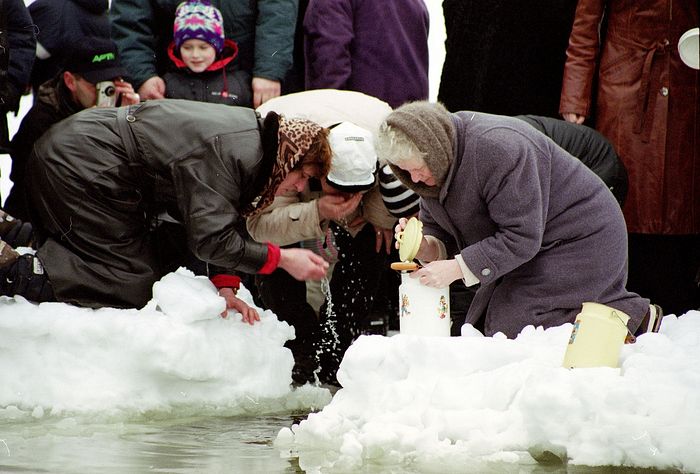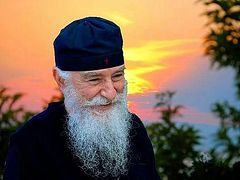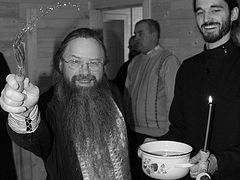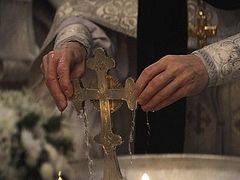Archpriest Alexander Lebedev talks about the meaning and significance of the feast of the Baptism of the Lord, how and when the grace-filled power of holy water manifests, and whether it can turn out to be “fruitless”.
Every Orthodox feast is testimony to the fact that God in His mercy never abandons us despite our sins, weaknesses, and inadequacies; it is a reminder of what God has done “for us men and for our salvation.” In addition, every Orthodox feast is not only a remembrance of some past events, but also a projection of these events into our everyday life.
The feast of the Baptism of the Lord (also called Theophany) is a clear example of this. We not only remember Christ’s immersion in the waters of the River Jordan—we in fact have contact with this very grace, which descended with our Savior upon the waters of this river. Just as in the Gospel times the waters of the Jordan were sanctified by contact with the Savior’s body, so in our own times are they sanctified on this day by the Church’s prayers, which in the words of the apostle Paul is the Body of Christ. Just as in distant times God manifested Himself in His Son Christ, so also in our days He manifests His power to us through the grace-filled qualities of Theophany water, which grants us “healing of infirmities, destroys the demons, and is filled with angelic power… unto the cleansing of soul and body, for the healing of the passions, the sanctification of homes, and unto all that is beneficial” (from the prayer at the Great Blessing of the Waters).
There is a term in Orthodoxy known as “synergy”, which in Greek means “co-participation”. Man’s salvation is only possible with his (man’s) cooperation with God: salvation and eternal life is a gift of God, but it must be received and preserved, and this requires man’s effort. God cannot save a man without his own participation. Thus, synergy means the combination of the wills and efforts of God and man. I am talking about this in order to call to mind that the grace-filled power of holy water as it manifests in our lives also depends directly on our synergy with God. Holy water serves for “the cleansing of soul and body, the healing of passions and infirmities” only if we are striving for this—for the cleansing of our souls and the overcoming of our sins.
It is typical for the narrow-minded consciousness to have a consumer’s view of everything around us: we see with extraordinary detail everything that can bring us profit, benefit, and pleasure, and at the same time we strive to avoid everything that requires effort, labor, and sacrifice from us. In the holy water of Theophany we see the opportunity to correct or confirm our well-being—first of all, of course, our health. (By “we” I mean the faithful who consider themselves Orthodox. An atheist’s or sectarian’s relationship to holy water is either one of indifference or enmity—I don’t count them in.) Nevertheless, do many of us recognize the unbroken connection between bodily benefit and spiritual effort? It is important to recognize this connection, because the bodily and the spiritual are inalienably bound together in man; we call the separation of soul and body death, cessation of life. This is correct also with regart to holy water—it manifests its vivifying power when a person receives it as an integral spiritual-physical reality. If we dismember this reality—looking at holy water as no more than an instrument that can “make me good”—then we actually kill it, deprive it of life, and render it of no benefit to us. Holy water, of course, does not cease to be holy; it only ceases to sanctify us. Let us remember this and we will labor to overcome our sins. Then the grace granted through holy water will become for us a source of strength to do this labor, the fruits of which are healing of soul and body. Amen.

